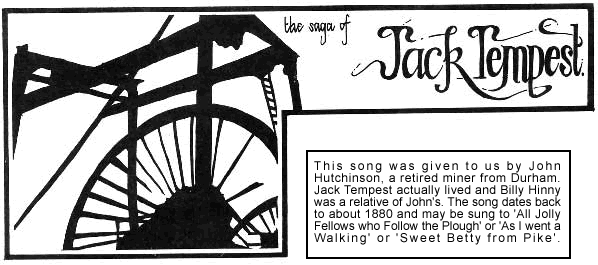
'Big hewer'
Jack Tempest* was a man of renown,
Round Hetton pits he was very well known!
Two juds* in a shift he would curve, scallop and clear*
And drink every evening three gallons of beer.
Chorus: What a man, what a man,
The like of Jack Tempest we'll ne'er see again.
He got down the coal in a manner most brisk,
For he tore at the seam with a five pounder pick*
Which few men could handle without a grave risk,
Of a strain in the back, the shoulder or wrist.
The coals that he loosened, both large and small
Went into the tubs, like a black waterfall,
From a special made shovel, which all viewed with awe,
For when heaped up and full it held three pecks or more.*
Billy Hinny his cross-marrow* would oft tell the tale,
How Tempest for water always did claim,
The steam from his sweat fell down just like rain,
So Tempest for 'droppers' always was paid.*
Once his shovel was broken by a big lump of coal
Was Tempest laid off, not on your soul.
He filled twenty more tubs, so it is said,
With a broad batten sleeper, trimmed sharp at the edge.
Tempest's end it was sudden, and caused much surprise,
He ate, for a bet, his height in penny pork pies,
Rolled home with his wits high in the skies,
Choked on a greasy dish cloth, and quietly died.
Some friends said the pies had finished him proper,
With the greasy dish cloth, he mistook for his supper,
So as they drank up their ale and talked of the matter
Agreed that we may be here today and gone by tomorrow.
Billy in the local when they laid him to rest,
Said "Tempest at hewing was one of the best,
But here while I'm talking I will now confess
He had the working man's weakness, lack of plain common sense."
More just by thinking can be got from his life
Than 'riving' and drinking and beating the wife;
If Tempest's brains had been powder set off by a cap,
The resulting explosion wouldn't have blown off his hat.
How often he'd a score to the eight I had wrought,
And often I envied as I weighed up the board,*
Now comes the verdict, plain and unsought,
Once a score to eight, now eight tubs to nought.
That all seeing power of the world we live in
Gives often long credit to the ignorant that sin,
But reserves always the right the debt to call in,
And weigh all in the balance before the judgement begins.
I beg of you friends to ponder and think
Or machines and smooth talkers may over you sit,
And pass on your experience, for the time swiftly flits;
A strong back's not enough if your brain is in splints.*
Looking into the future as time it rolls on,
The thinking machines and the 'know how' will come,
Callous greed and indifference have always been known;
Sheep have been sheared and butchered after being sold.
You're the inheritors of ten thousand years,
Of living and loving and laughter and tears,
Tomorrow's triumphs today are prepared:
Past years' mistakes today many do bear.
It is suggested that the last 3 verses have the following chorus:
So beware, oh beware,
Against scoundrels and schemers you should have a care.
********************
- a "big hewer" - was a crack coal hewer
known far and wide.
- juds - are undercutting in the seams from one side to the other in
bottom, middle or top. Jud in the top "bannocking". Nicking
was holing from top to bottom usually in one nook. Nicking shoulders
(i.e. one shoulder higher than the other) were quite common in miners
when I went down the pit at Lambton in 1914.
- curve - is to undercut with pick.
- scallop - is to hew down with hand pick.
- clear - is to fill loosened coal into empty tubs.
- pick blades - were 1¼, 1½, 2lb and 3lb for show-off.
2lb was used for curving and scalloping. Lighter ones for taking the
back out of a jud. 3lb picks were sometimes used for breaking in the
front of a jud when standing. The rest was done sitting on a cracket
(stool) or lying on the side with a shoulder rest.
- three pecks - is about 60lb or half a cwt.
- cross-marrow - is an opposite shift worker.
- wet or water - was paid for by "consideration". Usually
up to 4 inches bottom water did not count.
- top water or droppers - was put in for "consideration" on
measuring day. (There is a tale of a coal hewer called George Hutchinson
of Littletown pit who had a wooden leg and was only paid half wet consideration
because he only had one leg wet.)
|


